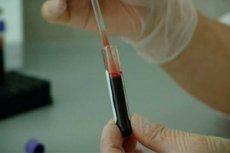New publications
Liquid biopsy with RNA modification analysis detects early stage colorectal cancer with 95% accuracy
Last reviewed: 15.07.2025

All iLive content is medically reviewed or fact checked to ensure as much factual accuracy as possible.
We have strict sourcing guidelines and only link to reputable media sites, academic research institutions and, whenever possible, medically peer reviewed studies. Note that the numbers in parentheses ([1], [2], etc.) are clickable links to these studies.
If you feel that any of our content is inaccurate, out-of-date, or otherwise questionable, please select it and press Ctrl + Enter.

Liquid biopsies are tests that look for signs of cancer using a simple blood draw. Unlike traditional biopsies, which require removing a piece of tissue, a liquid biopsy typically looks for mutations, or changes in modifications, in fragments of DNA from cancer cells circulating in the blood.
While liquid biopsies represent a promising, noninvasive way to detect and monitor cancer as it progresses, they are not as sensitive and accurate in the early stages of the disease.
Scientists at the University of Chicago have developed a more sensitive liquid biopsy test that uses RNA instead of DNA to detect cancer.
Using blood samples from colorectal cancer patients, the test was able to detect the earliest stages of the disease with 95% accuracy, significantly outperforming existing commercial non-invasive testing methods.
Difficulties in early diagnosis
When tumor cells die, they break apart and release bits of genetic material into the bloodstream. Standard liquid biopsies rely on this floating DNA, called circulating cell-free DNA (cfDNA), to detect cancer.
However, in the early stages of the disease, when tumor cells are still actively growing and multiplying, there is very little cfDNA in the blood.
“This has been a major problem for early detection. There’s just not enough tumor DNA in the blood,” said Chuan He, PhD, Distinguished Professor of Chemistry and Professor of Biochemistry and Molecular Biology at the University of Chicago.
“This has been a problem for all of us in detecting colorectal cancer early, so we decided to use RNA instead.”
Dr. He is the senior author of the study, "Modifications of microbiome-derived cell-free RNA in plasma discriminates colorectal cancer samples," published in Nature Biotechnology.
Why RNA?
RNA is an intermediate form of genetic code that copies and carries out the instructions of DNA to make the proteins needed by cells. RNA testing is a good indicator of gene activity because the presence of RNA means that cells are actively working and building proteins.
For the new study, graduate students Cheng-Wei Ju and Li-Sheng Zhang, a former postdoctoral fellow in He's lab (now a professor at the Hong Kong University of Science and Technology), began investigating the possibility of using circulating cell-free RNA (cfRNA) instead of cfDNA for cancer diagnosis and detection.
Studying the microbiome
The study showed that not only could we measure cfRNA modifications from human cells, but we could also detect RNA from gut microbes. Billions of bacteria coexist with us in our digestive system, and their activity also changes in the presence of cancer.
“We found that the RNA released by microbes had significant differences between cancer patients and healthy people,” Dr. He said.
“In the gut, when a tumor starts to grow, the neighboring microbiome reorganizes in response to inflammation, and this affects the surrounding microbes.”
The microbiome population renews much faster than human cells, with more cells dying and releasing RNA fragments into the bloodstream. This means that a test that measures modifications to microbial RNA could detect potential tumor activity much earlier than tests based on human tumor cell DNA.
Results
Existing commercial tests that measure DNA or RNA in stool are about 90% accurate in late-stage cancer, but their accuracy drops below 50% in early stages.
A new test based on RNA modifications showed nearly 95% accuracy overall, including high accuracy in the earliest stages of cancer.
“This is the first time that RNA modifications have been used as a potential biomarker for cancer, and it has proven to be much more reliable and sensitive than measuring RNA levels,” Dr. He said.
“The ability to detect cancer at these early stages is unprecedented.”
